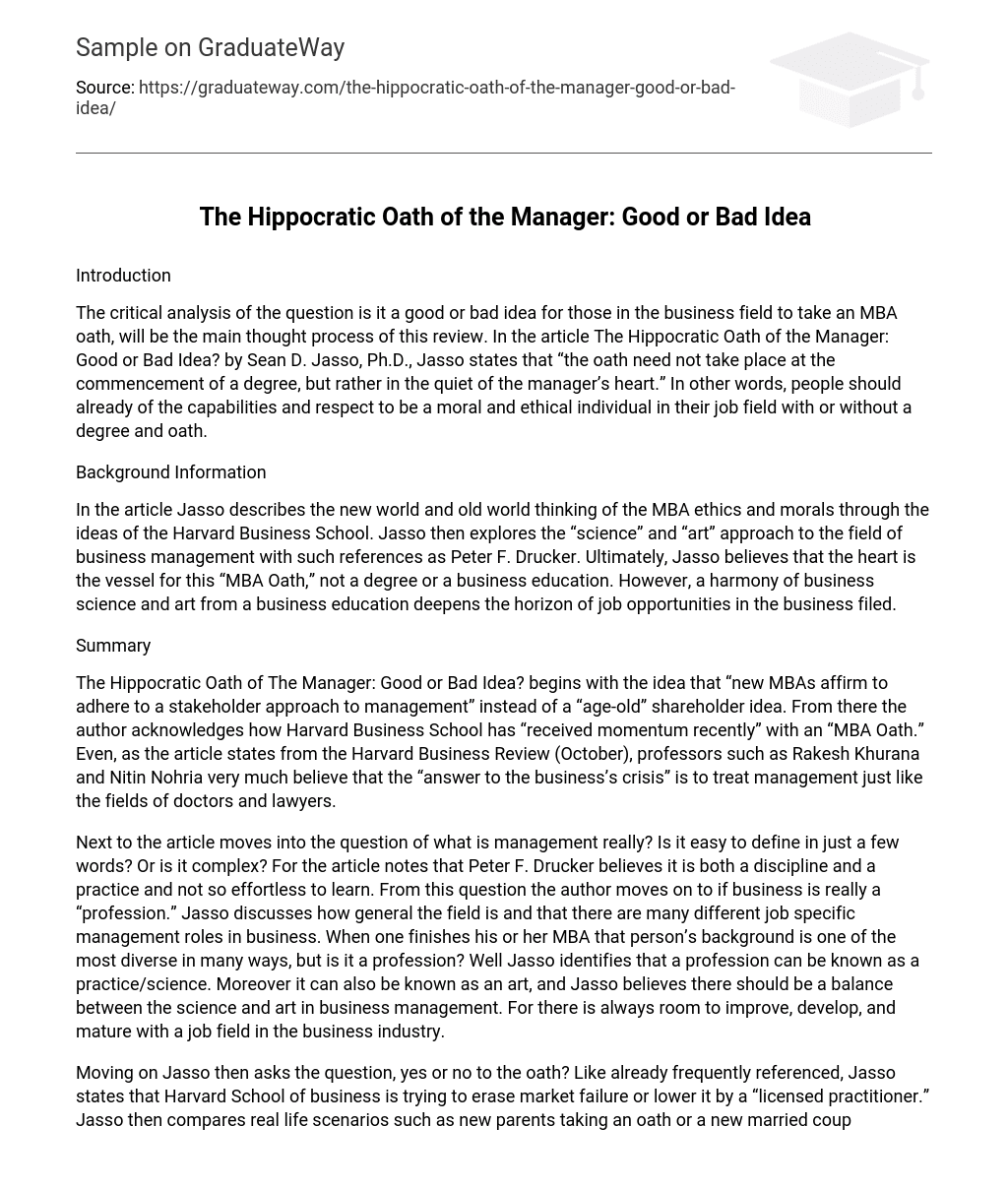Introduction
The critical analysis of the question is it a good or bad idea for those in the business field to take an MBA oath, will be the main thought process of this review. In the article The Hippocratic Oath of the Manager: Good or Bad Idea? by Sean D. Jasso, Ph.D., Jasso states that “the oath need not take place at the commencement of a degree, but rather in the quiet of the manager’s heart.” In other words, people should already of the capabilities and respect to be a moral and ethical individual in their job field with or without a degree and oath.
Background Information
In the article Jasso describes the new world and old world thinking of the MBA ethics and morals through the ideas of the Harvard Business School. Jasso then explores the “science” and “art” approach to the field of business management with such references as Peter F. Drucker. Ultimately, Jasso believes that the heart is the vessel for this “MBA Oath,” not a degree or a business education. However, a harmony of business science and art from a business education deepens the horizon of job opportunities in the business filed.
Summary
The Hippocratic Oath of The Manager: Good or Bad Idea? begins with the idea that “new MBAs affirm to adhere to a stakeholder approach to management” instead of a “age-old” shareholder idea. From there the author acknowledges how Harvard Business School has “received momentum recently” with an “MBA Oath.” Even, as the article states from the Harvard Business Review (October), professors such as Rakesh Khurana and Nitin Nohria very much believe that the “answer to the business’s crisis” is to treat management just like the fields of doctors and lawyers.
Next to the article moves into the question of what is management really? Is it easy to define in just a few words? Or is it complex? For the article notes that Peter F. Drucker believes it is both a discipline and a practice and not so effortless to learn. From this question the author moves on to if business is really a “profession.” Jasso discusses how general the field is and that there are many different job specific management roles in business. When one finishes his or her MBA that person’s background is one of the most diverse in many ways, but is it a profession? Well Jasso identifies that a profession can be known as a practice/science. Moreover it can also be known as an art, and Jasso believes there should be a balance between the science and art in business management. For there is always room to improve, develop, and mature with a job field in the business industry.
Moving on Jasso then asks the question, yes or no to the oath? Like already frequently referenced, Jasso states that Harvard School of business is trying to erase market failure or lower it by a “licensed practitioner.” Jasso then compares real life scenarios such as new parents taking an oath or a new married couple making wedding vows, and how similar it is to be making an MBA oath.
Ultimately, as already stated, Jasso ends the article stating that moral and ethical oath should come from the inside of an individual. It should not have to come from an education or a “MBA oath.” Good values and morals are common sense skills.
Evaluation
I am personally on the fence with the start of the article, in which the Harvard Business School’s various professors believe that an “MBA Oath” must be implemented to a student because the study should be treated like any other practice. However I do not believe, for example, that a manager at a clothing store would have the same obligations to his or her business as a manager at a sky diving school would. They are both businesses related and maybe both managers have MBAs, but they are not living by the same risks in their individual industry. The article even seems repetitive at times of the fact that business is a broad, open, and general field with many different job objectives. Therefore, we cannot judge business positions as hard or serious as we would a physician position for having to always care for a person’s physical and mental well-being without messing up. Also, the article is very strong at addressing that in this world of business now there is only a manager’s oath needed in the heart, and not for educational purposes.
I myself have had much experience with holding a manager’s oath for almost nine years of my retail career. Holding the positions of assistant manager and store manager gave me the responsibility to organize, delegate, and take care of my employees and customers with fairness and commitment. I almost daily had to go by a “Manager’s Oath” and make wise and reasonable decisions that would not create any risk or loss for my store.
Conclusion
Further research for why MBA students should not have to take an oath should honestly be the only idea researched. For in the end an education is not necessary to be involved with a career in business. Which means there are many in the business field taking these oaths on a personal, loyal, and trustworthy individual level.
In the end, the study of why or why not a manager in the business field should take an oath should not even be questioned in today’s world. All fields of work should have an oath at heart to be a good, ethical, and moral beings who look out not only for their needs but others as well. No business needs a negative manager to bring negativity into the work environment, so customers and employees can be driven away. No business needs an employee who is not loyal to the cause of business success.





